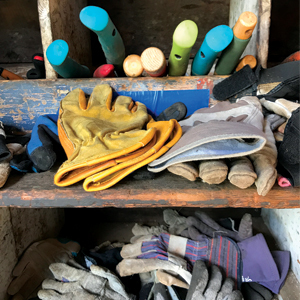Faith on the Farm
October 18, 2017 | Academics, Community, Continuing Education, Farminary, Farminary, Public, Spiritual Life, Students

On a typical day at Princeton Seminary’s 21-acre Farminary, students can be seen clad in boots and overalls gently turning rich, dark compost with shovels. Although this isn’t the traditional seminary classroom setting, this is where learning happens. Formerly a Christmas tree farm, the Farminary overlooks a pond and includes a 60-foot by 40-foot garden plot and a barn that is used for discussion and a place for sharing meals.
The Farminary is a place where theological education is integrated with small-scale sustainable agriculture to train faith leaders who are conversant in the areas of ecology, sustainability, and food justice. It is designed to train students to challenge society’s 24–7 culture of productivity by following a different rhythm, one that is governed by the seasons and Sabbath.
“The project’s main goal is to form leaders by cultivating agrarian sensibilities within them like paying attention to the seasons, understanding the interconnect- edness of life and death, and be- coming comfortable with failure,” says Nate Stucky, director of the Farminary Project.
Students from across the country and around the world enroll at the Seminary specifically because they want to be involved with the Farminary. They are seeking a community of Christian faith where they can explore their pedagogical imagination and connect the ecological with the theological.
Jacqueline Lapsley, associate professor of Old Testament, who taught Text and Terrain at the Farminary, says, “If students are doing the same work in the classroom, they are more likely to have a romantic view of the Old Testament texts we are reading. But when they are working on the farm—their knees hurt, there’s dirt under their fingernails, and sweat is dripping down their foreheads—it’s easier to relate to the texts as we talk about the earth, creation, and our relationship to the land.”
The Farminary is a place where students also grow as seminarians and
leaders. “Students with different stories, from different theological back-
grounds, and from different walks of life come together at the Farminary
to understand their beliefs, themselves, and God in a deeper way,” says
Pearl Quick ’20 MDiv/MACEF, student farm assistant.

“As students work together in the gardens or share meals, space opens up for humanizing conversations,” Stucky added. “There’s an opportuni- ty to process the content of the curriculum.”
Lapsley agrees. “The setting changes the relationship between faculty and students,” she says. “The kind of conversations we have on the farm are just different. Students have a lot of questions—both practical and vocational. They want to know how what we are reading will relate to what they’ll be doing out in the world.”
In addition to addressing vocational questions and explanations about the texts, the farm also provides a forum for theological reflection on pressing contemporary topics like sustainability, water, climate change, food justice, environmental justice, racial justice, and food sovereignty.
The 2017–18 academic year marks the introduction of the concentration in Theology, Ecology, and Faith Formation, which is open to all master’s-level students. The program trains students to recognize the connections between theology and current ecological issues and how to respond to those challenges.
Beyond the Seminary community, the Farminary provides an opportunity for community building. For example, Mercer Street Friends brings spoiled produce from their food bank to the farm’s compost pile—saving the organization money and putting food back into the ecological cycle.
During the summer, students from Shiloh Community Development Corporation’s Junior Chef program used the Farminary’s produce and space to prepare a meal for community members. This year also marked the third Just Food Conference at the farm and the second time the Farminary shared its harvest with members of the community through a CSA (Community Supported Agriculture) program.
Looking to the future, Stucky envisions adding bees, livestock, and new courses to the curriculum.





